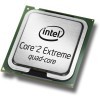- Qualcomm Launches Snapdragon 4 Gen 2 Mobile Platform
- AMD Launches Ryzen PRO 7000 Series Mobile & Desktop Platform
- Intel Launches Sleek Single-Slot Arc Pro A60 Workstation Graphics Card
- NVIDIA Announces Latest Ada Lovelace Additions: GeForce RTX 4060 Ti & RTX 4060
- Maxon Redshift With AMD Radeon GPU Rendering Support Now Available
Intel Core 2 Extreme QX6850 Quad-Core

Intel today is announcing their 1333FSB Core 2 line-up, which consists of three dual-cores, including the E6750 we previewed a few weeks ago, and also the 3.0GHz quad-core that we are testing out today. Read on as we explore all of what Intel’s latest flagship processor has to offer.
Page 12 – Final Thoughts
Intel’s QX6850 has been an enjoyable chip to benchmark and stress-test with, but that’s probably not much of a surprise. It has four cores and rolls in with the highest clock speed to hit the Core 2 series. Even comparing this CPU to our Q6600, the extra clock speed has clear advantages in applications that access all of the cores.
But now we come back to the question of whether or not the processor is worth it’s $999 (higher at retail) price tag. Like most top-end computer components, it’s up to you, the consumer, to decide whether you are willing to pay such a premium for the fastest processor on the market. For non-overclockers that have money, it’s going to serve them well if they are huge multi-taskers or regularly use multithreaded applications.
As we saw throughout our testing, more and more applications are becoming available that will fully use your extra cores, not just workstation applications such as 3D Studio Max. Nero Recode, Adobe Lightroom and even 7-Zip showed very large improvements when four cores were used. Clearly though, we are in need of even more. There are many applications used for testing today that are still single core, such as LAME and ImageMagick.
Quad-core processors in general are designed for those who are hardcore multi-taskers, and those who, like modelers, use applications that will greatly benefit with extra cores and higher frequency. However, the QX6850 is really in a league of its own, given the price.
Allow me to quote myself, “The only downside, of course, is the price. One has to wonder if the premium nowadays is truly worth it, considering the performance of the budget offerings can still be considered extreme by today’s standards.”
With these new launches, we will have a re-launched Q6700 processor which clocks at 2.66GHz and sells to retailers for $530, almost half of the QX6850. At that point, you could purchase the $530 processor and overclock yourself to reach QX6850 speeds with relative ease. But as mentioned, those who refuse to overclock have even fewer options. Price drops are also on the way, and it’s speculated that the Q6600 2.4GHz will sell to retailers for $266 in quantities of 1,000. Intel has not verified any of this yet, but if it proves true, then even I will be purchasing one for my main machine. Just last year, the dual core version of the same chip retailed for much more than that.
So as with most products we review, it all comes down to price. Given that this is a premium part, it’s up to the consumer to decide it’s value. Most enthusiasts have no problem in buying a cheaper part and overclocking it. But that aside, the Q6600 won’t overclock to 3.337GHz on stock voltages like our QX6850 did. Many factors come into play with parts like this, and by now, you should have a good idea of whether or not it’s for you.
For those who don’t care to spend over $1,000 on a CPU, the prices of these new processors are still enough to instill excitement. The E6750 2.66GHz will retail for ~$200, a true ‘bargain’ considering the speed that comes along with it. Given that all these CPUs use a 1333FSB native bus, you are ready to pair it up with some DDR3 of the same frequency.
Times are good to be building a new PC. The Core series is impressive enough, but these new prices are hard to ignore. Penryn will be launching later this year, which will be worthy of paying attention to as well. It will bring more efficient processors to the table, based on a 45nm process in addition to High-K MG transistors. Extra cache and higher frequencies are also expected.
Penryn will not be ‘dirt cheap’ as C2D are now though, so it’s not worth holding off for if you need a new processor right now. Stay tuned, as we will be covering both Penryn and Nehalem in more depth in the months to come.
If you have a comment you wish to make on this review, feel free to head on into our forums! There is no need to register in order to reply to such threads.
Support our efforts! With ad revenue at an all-time low for written websites, we're relying more than ever on reader support to help us continue putting so much effort into this type of content. You can support us by becoming a Patron, or by using our Amazon shopping affiliate links listed through our articles. Thanks for your support!






